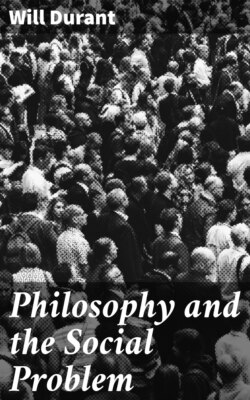Philosophy and the Social Problem

Реклама. ООО «ЛитРес», ИНН: 7719571260.
Оглавление
Уилл Дюрант. Philosophy and the Social Problem
Philosophy and the Social Problem
Table of Contents
PART I. HISTORICAL APPROACH
PHILOSOPHY AND THE SOCIAL PROBLEM
INTRODUCTION
CHAPTER I. THE PRESENT SIGNIFICANCE OF THE SOCRATIC ETHIC
I. History as Rebarbarization
II. Philosophy as Disintegrator
III. Individualism in Athens
IV. The Sophists
V. Intelligence as Virtue
VI. The Meaning of Virtue
VII “Instinct” and “Reason”
VIII. The Secularization of Morals
IX “Happiness” and “Virtue”
X. The Socratic Challenge
CHAPTER II. PLATO: PHILOSOPHY AS POLITICS
I. The Man and the Artist
II. How to Solve the Social Problem
III. On Making Philosopher-Kings
IV. Dishonest Democracy
V. Culture and Slavery
VI. Plasticity and Order
VII. The Meaning of Justice
VIII. The Future of Plato
CHAPTER III. FRANCIS BACON AND THE SOCIAL POSSIBILITIES OF SCIENCE
I. From Plato to Bacon
II. Character
III. The Expurgation of the Intellect
IV. Knowledge is Power
V. The Socialization of Science
VI. Science and Utopia
VII. Scholasticism in Science
VIII. The Asiatics of Europe
CHAPTER IV. SPINOZA ON THE SOCIAL PROBLEM[82]
I. Hobbes
II. The Spirit of Spinoza
III. Political Ethics
IV. Is Man a Political Animal?
V. What the Social Problem Is
VI. Free Speech
VII. Virtue as Power
VIII. Freedom and Order
IX. Democracy and Intelligence
X. The Legacy of Spinoza
CHAPTER V. NIETZSCHE
I. From Spinoza to Nietzsche
II. Biographical
III. Exposition. 1. Morality as Impotence
2. Democracy
3. Feminism
4. Socialism and Anarchism
5. Degeneration
6. Nihilism
7. The Will to Power
8. The Superman
9. How to Make Supermen
10. On the Necessity of Exploitation
11. Aristocracy
12. Signs of Ascent
IV. Criticism
V. Nietzsche Replies
VI. Conclusion
PART II. SUGGESTIONS
CHAPTER I. SOLUTIONS AND DISSOLUTIONS
I. The Problem
II “Solutions” 1. Feminism
2. Socialism
3. Eugenics
4. Anarchism
5. Individualism
6. Individualism Again
III. Dissolutions
CHAPTER II. THE RECONSTRUCTIVE FUNCTION OF PHILOSOPHY
I. Epistemologs
II. Philosophy as Control
III. Philosophy as Mediator between Science and Statesmanship
CHAPTER III. ORGANIZED INTELLIGENCE
I. The Need
II. The Organization of Intelligence
III. Information of Panacea
IV. Sex, Art, and Play in Social Reconstruction
V. Education
CHAPTER IV. THE READER SPEAKS
I. The Democratization of Aristocracy
II. The Professor as Buridan’s Ass
III. Is Information Wanted?
IV. Finding Mæcenas
V. The Chance of Philosophy
CONCLUSION
Отрывок из книги
Will Durant
Published by Good Press, 2019
.....
THIS is frank intellectualism, of course; and the best-refuted doctrine in philosophy. It is amusing to observe the ease with which critics and historians despatch the Socratic ethic. It is “an extravagant paradox,” says Sidgwick,[8] “incompatible with moral freedom.” “Nothing is easier,” says Gomperz,[9] “than to detect the one-sidedness of this point of view.” “This doctrine,” says Grote,[10] “omits to notice, what is not less essential, the proper conditions of the emotions, desires, etc.” “It tended to make all conduct a matter of the intellect and not of the character, and so in a sense to destroy moral responsibility,” says Hobhouse.[11] “Himself blessed with a will so powerful that it moved almost without friction,” says Henry Jackson,[12] “Socrates fell into the error of ignoring its operations, and was thus led to regard knowledge as the sole condition of well-doing.” “Socrates was a misunderstanding,” says Nietzsche;[13] “reason at any price, life made clear, cold, cautious, conscious, without instincts, opposed to the instincts, was in itself only a disease, … and by no means a return to ‘virtue,’ to ‘health,’ and to happiness.” And the worn-out dictum about seeing the better and approving it, yet following the worse, is quoted as the deliverance of a profound psychologist, whose verdict should be accepted as a final solution of the problem.
Before refuting a doctrine it is useful to try to understand it. What could Socrates have meant by saying that all real virtue is intelligence? What is virtue?
.....